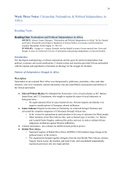Samenvatting
Politics: Africa Summary of Week 3 Reading
- Vak
- Politics: Africa
- Instelling
- Universiteit Leiden (UL)
Adeyeri, James Olusegun, “Nationalism and Political Independence in Africa” In Ojo, Samuel and Falola, Oloruntoba (eds) Palgrave Handbook of African Politics, Governance and Development (London: Macmillan, 2018) Chapter 12, 203-213.
[Meer zien]




